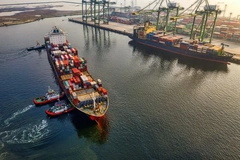EU packaging laws impact China’s market strategies, analysts uncover
Key takeaways
- ICIS and CPCIF report finds rising EU demand for recycled materials creates export opportunities for China.
- Early compliance with EU packaging regulations could make Chinese recyclers preferred global suppliers.
- Study predicts chemical recycling will be key to meeting EU’s growing demand for recycled polyolefins.

As manufacturers prepare for the EU’s Packaging and Packaging Waste Regulation, demand for recycled materials is rising. A recent report notes that this trend presents Chinese producers with an opportunity to align with EU standards early on and invest in R&D for recycled and bio-based materials.
The study, co-authored by the UK-based Independent Commodity Intelligence Services (ICIS) and the China Petroleum and Chemical Industry Federation (CPCIF), outlines the impact of EU circularity regulations on global trade and suggests opportunities for Chinese export industries.
Helen McGeough, global analyst team lead for Plastics Recycling at ICIS, says: “This study shows that EU circularity regulation is no longer just a regional policy. It’s becoming a global market force, shaping industrial strategies and supply chains worldwide.”

“China’s proactive response may prove pivotal in narrowing the gap between domestic and international standards and accelerating the global transition to a circular economy.”
It stresses that in the packaging and automotive industry, early compliance with EU regulations could make China-based recyclers the preferred global suppliers. Moreover, companies must view compliance as a “strategic advantage” rather than a burden.
EU targets impact China
In the report, the ICIS estimates that EU domestic producers will need to integrate 5.4 million metric tons of recycled PE, PP, and PET (rPE, rPP, and rPET) combined each year until 2030 to meet minimum recycled content targets for packaging, automotive, and fiber applications.
After 2030, the figure is projected to increase to 11.5 million metric tons per year until 2040.
The study notes that as a major trading partner to the EU, China will be directly impacted by recycled content targets. It estimates that over 1 million metric tons of rPE, rPP, and rPET will be needed to meet the demand for exported goods by 2040.
The research highlights that while this number is relatively small when compared with the size of the industry in China, it is expected to have an impact.
.webp) The study notes that, to meet EU regulations, products will need to be redesigned for recyclability.“The impact for exporters into Europe underscores that compliance is not only a precondition for market entry, but also an emerging axis of global competition,” say the study authors.
The study notes that, to meet EU regulations, products will need to be redesigned for recyclability.“The impact for exporters into Europe underscores that compliance is not only a precondition for market entry, but also an emerging axis of global competition,” say the study authors.
Investing in recycled content
To capitalize on this “emerging axis,” the study reveals that products will need to be redesigned for recyclability, alongside certification and verification of efficacy. It explains that this might drive up short-term operational costs. However, these costs are necessary to overcome differing regulations, note ICIS and CPCIF.
The authors add: “Applying EU-compliant packaging standards across all export destinations may prove more cost-effective than managing differentiated packaging streams depending on the export partner.”
Due to China’s ban on plastic imports in 2018 and upcoming EU recycled content targets, the gap in practices and legal frameworks between the EU and China has widened, according to ICIS and CPCIF.
Early compliance and investment in circular systems could help China bridge the gap between its domestic and international market standards. If done, the study notes that Chinese companies could also “catalyze broader transformation in the market, fostering strategic alliances that strengthen competitiveness.”
The impact on recycling
The EU’s Packaging and Packaging Waste Regulations’ impact on supply and demand for recycled content is closely tied to developments in recycling infrastructure.
The study highlights that EU requirements are expected to drive the establishment of domestic recycling standards in China, “potentially bolstering its internal demand for recycled polymers.”
In addition, it explains that, as mechanical recycling cannot meet food-safety and performance requirements, it predicts that chemical recycling will be “crucial” to meet the demand for polyolefin recycled feedstocks.
Recently, EU manufacturers began to adopt chemically recycled materials. OMV launched chemical recycling operations in Austria, and Südpack, BASF, and Werz launched chemically recycled meat packs.











